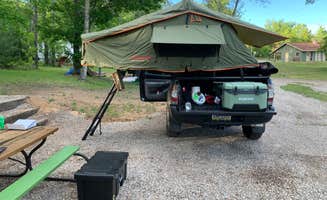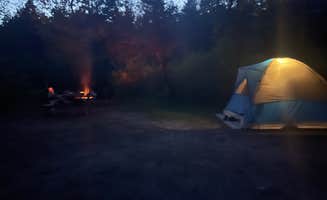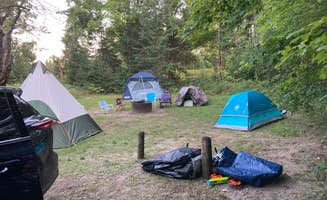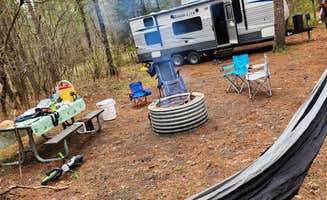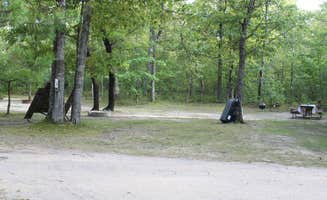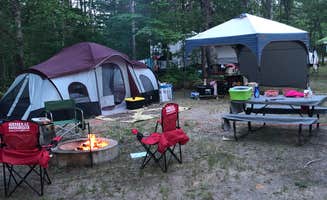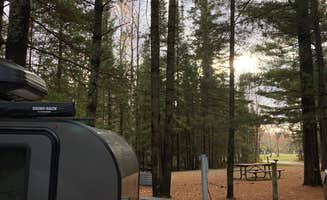Dispersed camping options near Vanderbilt, Michigan provide access to Michigan's elk country while offering quieter alternatives to developed campgrounds. The area sits within the Pigeon River Country State Forest at elevations between 900-1,300 feet, creating varied terrain for hiking and wildlife viewing. Winter camping opportunities exist at select locations, though access roads may require four-wheel drive from November through April.
What to do
Elk viewing opportunities: The Pigeon River State Forest area hosts Michigan's only free-roaming elk herd. "This was a really awesome campground we found kind of last minute when things didn't work out at the other place we were trying to camp... You're right by Michigan's only area to view free roaming wild elk!" shares a camper at Haakwood State Forest Campground.
Kayaking and river access: The Sturgeon River provides excellent paddling opportunities. "Judy is lovely. River access great. My favorite place to camp and kayak," notes a visitor to Sturgeon Valley Campground. Many sites allow direct water access for easy launching.
Mountain biking and hiking trails: Several trail systems connect through the forest. "The Shingle Mill Pathway (a roughly 10 mile loop trail) runs through the campgrounds which is ideal for hiking, backpacking, and mountain biking," explains a camper at Pigeon River State Forest Campground.
What campers like
Secluded river sites: Camping alongside flowing water ranks highly among visitor preferences. "Me and my son picked one of a few spots on the pigeon river. The river ran along the edge of our site. Highly recommend, but the current is strong so beware if you have little ones," cautions a visitor to Pigeon River State Forest Campground.
Dark skies for stargazing: The remote location offers exceptional night sky viewing. "Fall camping here is the best. So quiet, and so dark you can see all the stars! Elk were bugling and it was wild!!!" enthuses a visitor to Elkwood Campground.
Lake access for swimming: Clear lakes provide refreshing swimming options. "Great state forest campground. $15 per night can't be beat. Sites are great for tents and RVs but no electricity... Lake is perfect for swimming," notes a camper at Pickerel Lake State Forest Campground.
What you should know
Limited cell service: Most forest campgrounds have minimal to no connectivity. "Make sure you have all of your supplies before you arrive as the nearest town is 20+ minutes away. Bring a map/gps because there is no cell service," advises a Pigeon River State Forest camper.
Poison ivy awareness: Some campgrounds have problematic vegetation. "Beware of poison ivy- it is everywhere. Extremely disappointed to find it all over the campground and site— but our site was fantastic," reports a visitor to Petoskey State Park Campground.
Road noise concerns: Locations near major roads may experience traffic sounds. "It is right next to the road and there is a lot of road noise during the day and early evening. It did quiet down overnight," explains a Haakwood State Forest camper.
Ticks during summer months: Hikers should take precautions. "The shingle mill pathway in Pigeon River State Forest was a nice, quiet trail. Went on a Thursday in June and saw 1 other person over 2 days. The only problem with this hike was the insane amount of ticks," warns a backpacker.
Tips for camping with families
Look for campgrounds with bike paths: Paved trails provide safe cycling options. "Nice paved path through the campground, great for kids riding bikes around camp. They also have a playground with a cool old fashion slide," mentions a visitor to Otsego Lake State Park Campground.
Check water depth for swimming: Lake conditions vary substantially. "If you like the beach, you'll easily get out in the water over 100 yards and still be safe (roughly 3feet or so). Bring your kayaks too," suggests a camper at Burt Lake State Park.
Consider campground noise levels: Some locations are quieter than others. "We love this park, great lake, small comfortable park and safe! Great bike riding park for little ones," shares an Otsego Lake visitor.
Watch for wildlife viewing times: Early morning and dusk offer best opportunities. "We went and tried, but unfortunately didn't see any elk. I think it was mostly due to my 7 and 10 year old talking too much, and being too loud," notes a Haakwood camper.
Tips from RVers
Uneven sites require leveling: Many campgrounds have significant slopes. "Site 52 and sites in immediate area was over 12" out of level from front to back. Looked like our camper was doing a wheelie," warns an Otsego Lake State Park visitor.
Limited hookup options: Most forest campgrounds lack electrical connections. "You can pick sites on the river or back by the woods. There are vault toilets and a well for water... I've seen people tenting and I've seen people with large fifth wheels. Some sites are only big enough for tents but most sites can fit large RVs," explains a Pigeon River camper.
Extension cords may be necessary: Power connections aren't always conveniently located. "There is no water or sewer hook up. The lot lines are strange, they run on an angle. Bring extension cords for the electric service," advises a Burt Lake State Park visitor.
Narrow access roads: Some campgrounds have tight entrances. "Sites are great for tents and RVs but no electricity. Hand pump wells for drinking water and vault toilets that are well kept," notes a Pickerel Lake camper.


